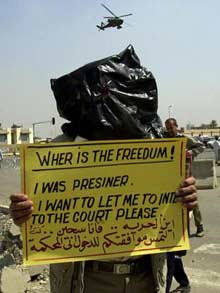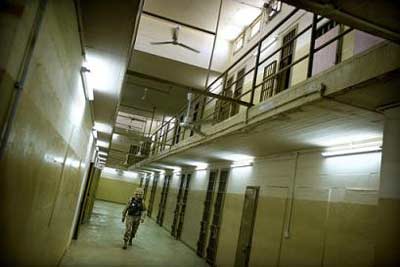|
Soldier: Abu Ghraib prison abuse normal
(Agencies)
Updated: 2004-05-21 09:12
Interrogators at Baghdad's Abu Ghraib prison viewed sleep deprivation, stripping inmates naked and threatening them with dogs as normal ways of dealing with "the enemy," a soldier attached to military intelligence at the prison said Thursday.

Former Iraqi detainee in the Abu Ghraib prison, Saddam Saleh, 29, demonstrates with a banner reading 'Where is the freedom' outside the heavily guarded 'Green Zone' in Baghdad, Iraq, Wednesday, May 19, 2004 as the arraignments began inside the 'Green Zone' for three soldiers charged with abusing prisoners at Abu Ghraib. [AP Photo] |
But while military police are now facing charges — and with one already convicted — it was clear that U.S. Army military intelligence ran the prison, Sgt. Samuel Provance told the Associated Press.
A sign on the wall inside Abu Ghraib laid out interrogation rules, Provance said. It said that harsh methods — "such as sleep deprivation, altering the diet" — required command-level approval, but didn't spell out specifically who that meant.
Who gave orders to the Army military police at Abu Ghraib is disputed among U.S. commanders, and Provance said from his position he couldn't tell.
"But I do know that military intelligence was in charge of the operation," he said by telephone from Heidelberg, where his unit is based. "The only responsibility that the military police had was to secure the detainees."
At Abu Ghraib, if military intelligence interrogators "said 'We want him naked,' it would be the MPs who would get him out his clothes," Provance added.
Maj. Gen. Geoffrey Miller, the former commander of the Guantanamo Bay prison camp who is now in charge of U.S.-run prisons in Iraq, denied Thursday that the military condoned prisoner abuse.
"I can tell you with absolute certainty that there was no official policy nor any sanction of any of the abuses of this type," he said on CBS television. "Your Army does not do things like this."
The scandal broke after photographs were made public of U.S. soldiers abusing prisoners, sparking worldwide outrage.
Provance, who has testified to U.S. military officials investigating the treatment of the inmates, said he was in charge of a computer network at the Baghdad prison and never witnessed abuse himself.
But he said interrogators told him about the methods they used — including sleep deprivation, removing clothes and playing loud music to try to break down inmates and get information.
"Whether or not they were approved (methods), I don't know," he said.
Provance said he was told by colleagues that a female interrogator once made a male detainee walk nude from one end of the prison to the other in front of other prisoners.
When a naked detainee tried to use the bag from a packaged military meal as a loincloth, his jailers stopped bringing him food in that form, he said.
Provance is with the 302nd Military Intelligence Battalion, a unit of the 205th Military Intelligence Brigade, which has been implicated in the alleged abuse at Abu Ghraib.
He said he rarely saw the brigade commander, Col. Thomas Pappas, who lived in another part of the sprawling prison.
U.S. officials have said that superiors of the guards accused of abuse may also be punished.
Provance indicated he was speaking out now because he believes military intelligence is covering up what happened or being protected.
"I'm just surprised at the silence from military intelligence that I know was very much involved at the prison, (that it) has nothing to say about the matter," the sergeant said.

A U.S. soldier walks between cells containing Iraqi detainees at the Abu Ghraib prison outside Baghdad, Monday May 17, 2004. [AP Photo] |
Humiliation and mistreatment of inmates "was not discussed because it was considered normal."
Provance said: "Nobody really talked about it. It was the enemy, why sympathize with him."
Abu Ghraib, he said, "was a haunted place."
Provance said that when he got to the prison last October, he was surprised to see soldiers walking around without uniforms. By the time he left in February, discipline had improved and the number of interrogators had increased.
Back in Germany, he was interviewed by Maj. Gen. George Fay, an assistant to the Army's deputy chief of staff for intelligence who is looking into military intelligence practices and procedures in Iraq.
"He just asked questions and took on more of a listening role," Provance said. "But I was made to feel that my testimony was unwelcome."
Provance, of Williamsburg, Va., said he had been summoned for a talk with his superiors in Germany on Friday, apparently because of previous statements to the media.
"I'm a soldier," he said. "I feel that if I was a prisoner, I would want honorable treatment."
|